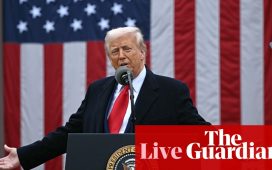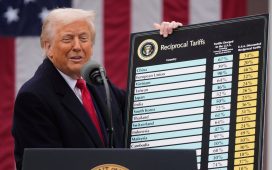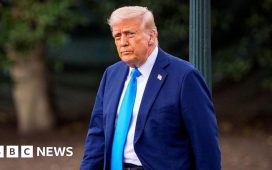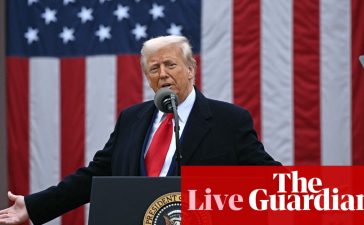Introduction: World markets on track for biggest monthly loss since 2022
Good morning, and welcome to our rolling coverage of business, the financial markets and the world economy.
Donald Trump’s trade war is alarming the global markets, sending shares sliding in their worst month in over two years.
Stock markets across the Asia-Pacific region are in retreat this morning, as investors fear Trump will announce swingeing new tariffs on Wednesday, which has been dubbed “Liberation Day” by the US president.
Japan’s Nikkei has lost 3.9%, down 1,457 points at 35,662 points today, while South Korea’s KOSPI is down 3%, Australia’s S&P/ASX 200 has fallen 1.7%. In China, which has already been hit by Trump tariffs this year. the CSI 300 is 0.9% lower.
These are just the latest losses in a bad month for the financial markets. MSCI’s index of global stocks had fallen around 4.5% since the start of March, even before today is priced in, which would be the worst month since September 2022.
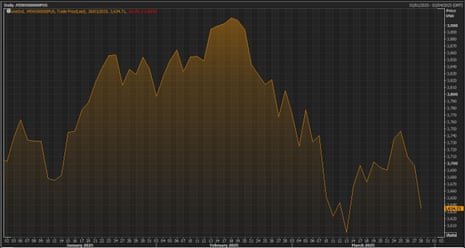
Today’s selloff comes after Donald Trump told reporters that the reciprocal tariffs he is set to announce this week will include all nations.
He told reporters on Air Force One:
“You’d start with all countries. Essentially all of the countries that we’re talking about.”
That is a blow to hopes that the White House might only target countries with the largest trade imbalances against the US.
Investors have also been spooked by recent bad economic news from the US.
On Friday, core inflation rose by more than expected, while consumer sentiment weakened to its lowest level since 2022. That drove shares down on Wall Street on Friday, and captured the fears in the markets right now.
Kyle Rodda, senior financial market analyst at capital.com, explains:
The dynamic is a microcosm of the essential fear in the market right now. Trade policy and even merely the uncertainty generated by it is weakening growth but also contributing to sticky inflation, meaning the Fed is going to have marginally less capacity to cut interest rates if (or when) US economic activity starts to falter.
The problem was hammered home further by a revised University of Michigan Consumer Sentiment survey which revealed even higher 1-year inflation expectations of 5% and a greater deterioration in confidence.
The agenda
-
9.30am BST: Bank of England mortgage approvals and consumer credit
-
1pm BST: German inflation rate for March
-
3.30pm BST: Dallas Fed Manufacturing Index for March
Key events

Sarah Butler
Back in the UK, it has emerged that Primark boss Paul Marchant, who this week left the company with immediate effect after admitting an “error of judgment” in his treatment of a woman at a social occasion, had previously been investigated for inappropriate behaviour by his employer.
ABF admitted:
“One previous incident involving inappropriate communication was investigated some time ago. Proportionate action was taken at the time.”
Donald Trump’s enthusiasm for tariffs has made the first quarter of 2025 a “highly eventful period for markets”, says Deutsche Bank in a new report.
They remind us what a dramatic three months it has been:
The US began to impose widespread tariffs, going well beyond those in Trump’s first term. Europe started a huge fiscal regime shift, which even saw Germany reform its constitutional debt brake. DeepSeek’s AI model led to questions about US tech valuations, pushing the Mag 7 into bear market territory. And given the tariff uncertainty and the market sell-off, speculation mounted about a US recession, which would have been almost unthinkable at the start of the year.
So, what might Q2 bring? It all depends what Donald Trump announces on Wednesday, and how other countries react…
Deutsche explain:
Clearly, the reciprocal tariffs on April 2 will be the initial focus, and if other countries retaliate, the big risk is it sets off a broader escalation spiral that exacerbates investor concern.
The second key question is whether the weakness in recent economic surveys starts showing up in the hard data, as that could start to catalyse broader downgrades and ramp up fears of a downturn.
Third, will inflation remain sticky above target across the major economies, as that would really constrain central banks if so, who are mostly still trying to ease policy.
And finally, as in any 3-month period, what are the unknown factors that could take us by surprise, just as we saw in Q1 with the European fiscal shift?
S&P 500 in correction territory
Today’s sell-off has dragged the S&P 500 index of US shares into correction territory – more than 10% off its all-time high.
By Kathleen Brooks, research director at XTB, sums up the mood:
There is an air of capitulation in financial markets ahead of the April 2nd reciprocal tariff announcement from the US. Global stocks are all in the red, the Eurostoxx 50 index is down by 1.7%, and all sectors are in the red. The biggest decline is for industrial stocks and consumer discretionary, followed by the financial sector. Reciprocal tariff fears are infecting the whole stock market, even defensive sectors like energy and utilities are lower at the start of the week, which is a sign that investors are cutting their positions sharply and choosing to pause ahead of this week’s tariff announcements.
US stocks have also plunged at the open on Monday and the S&P 500 is now in correction territory, dipping 10% from its peak in mid- February.
Tariff fears have deepened over the weekend, there has been no let up from President Trump who said that no country would be able to avoid his reciprocal tariffs.
This dashed any hopes for a last-minute reprieve. There is no where to hide in the stock market, as equities get caught up in the tariff headwinds, which is not helped by the fact that it is the last trading day of Q1.
As flagged earlier, shares in Tesla have dropped 5.7% in early trading, to $248.72.
The president’s Trump Media & Technology Group Corp are down 4.7%.
The S&P 500 index and the Nasdaq have both hit six-month lows, dropping back to levels last seen some weeks before the US presidential election.
Wall Street joins global sell-off
US stock indexes have opened sharply lower in New York, aa fears that the Trump White House will announce wide-ranging tariffs trigger a stampede to the exits.
In early trading, the Dow Jones Industrial Average has dropped by 304 points, or 0.7%, to 41,278. The broader S&P 500 has dropped by 1.4%, while the tech-focused Nasdaq has lost 2.4%.
Investors on Wall Street, like in Europe and Asia, are alarmed by Donald Trump’s warning over the weekend that Wednesday’s reciprocal tariffs will “start with all countries. Essentially all of the countries that we’re talking about.”
Traders will have also noted Goldman Sachs’s warning that there is now a 35% risk of a US recession.
These losses mean world stock markets are firmly on course to make March their worst month since 2022, as covered in the introduction.
As Investec analysts explains:
After a bruising period of uncertainty, businesses and financial markets are braced for the US administration’s planned announcement of extra tariffs on 2 April. Behind the scenes, negotiations are underway to limit the damage to trade from ‘Liberation Day’, as Trump has dubbed it.
The scope for this is unclear: if tariff rises are to raise meaningful funding towards tax cuts they will need to be both large and durable. But it is not just US actions that will impact economies; countermeasures will too.
Conversely though, the planned big step up in European defence spending is a tailwind to counter at least some of the headwinds from US policy shifts, which in any case will not fall evenly across countries. Uncertainty looks almost certain to persist beyond 2 April, leaving scope for markets, and us, to reassess the outlook in future.
Why Trump trade war could push UK into recession
A UK recession is more than likely this year for two reasons, to say the least, Professor Costas Milas of the University of Liverpool’s management school tells us:
-
Divisia money growth, which is a reliable predictor of UK growth, has just slowed down to 2.4% per annum in February (down from 2.8% in January).
-
As I also write in my LSE Business Review blog, Trump’s trade wars are already impacting negatively on business investment, and consequently UK economic growth. Nevertheless, Trump’s trade wars have not yet “commenced” in full strength. If trade wars accelerate from April the 2nd onwards, the impact will be much more severe, and therefore, it is more likely than not that we will end up with a UK recession…
Politico: Republicans scramble to shield their states from Trump’s next wave of tariffs
Politico are reporting that “swaths of Republicans on Capitol Hill” are scrambling to shield their states from Donald Trump’s next wave of tariffs.
While the US president claims tariffs will benefit America, it seems many of his own party have realised the damage that slapping tariffs on imports, and risking a tit-for-tat trade war, will have.
Politico says “dozens of GOP lawmakers”” are privately worried that another round of tariffs will raise prices on U.S. consumers, cripple American farmers and rattle the stock market.
They explain:
In anticipation, they are coordinating with various industry groups to push the administration for exemptions that protect key local industries from that kind of pain. They’re also trying to effectively void some of the tariffs on key products once they go into effect, lining up to push Trump officials for so-called exclusions.
Their quiet maneuvering signals the heightened anxiety among Republicans about the next phase of his trade wars — and the political pitfalls ahead for the president and his party. Four Republicans with direct knowledge of the strategy, granted anonymity to discuss the private conversations, described the behind-the-scenes planning as concerted and targeted.
Scoop: Despite Trump’s claims his April 2 tariffs will mark “Liberation Day” —
scores of Republicans on Capitol Hill are scrambling to shield their states from economic fallout
Many already dead-set on pushing exclusions for farmers + more w/ Commercehttps://t.co/t4I4XX7NhF
— Meredith Lee Hill (@meredithllee) March 31, 2025
Trump Media & Technology Group, and Tesla, both down in pre-market trading
The Wall Street futures market does not make pleasant viewing from the White House.
Trump Media & Technology Group Corp, which runs the US president’s Truth Social social-media platform, are on track to fall 3.7% when trading begins in an hour’s time.
Elon Musk’s Tesla is also heading for a bath – its shares are down 6% in premarket trading.
Trump 2.0 has been much more painful for the financial markets than the president’s first early stint in the White House.
Tomorrow will be 50 trading days since the new Trump administration began.
If futures hold, the S&P 500 will be down 8% through Trump 2.0’s first 49 trading days vs. a gain of 4% at this point during Trump 1.0. pic.twitter.com/N3TNfLEjL5
— Bespoke (@bespokeinvest) March 31, 2025
Liberation Day could also be Demolition Day
With world markets in retreat, investors are “voting with their feet” ahead of Wednesday’s announcement about which broad-based secondary tariffs the US will impose.
So explains Tom Stevenson, investment director at Fidelity International, who points out that tariffs will hurt the US economy as well those of its trading partners.
Stevenson says:
“The US’s approach to tariffs has been so unpredictable that no-one is prepared to second guess what will actually happen come Wednesday, which has been dubbed Demolition, as well as Liberation, Day. It’s a question of take cover first and assess the danger later.
“Investors are starting to price in the growing likelihood of a painful cocktail of recession coupled with stubbornly high inflation. What has surprised many is the extent to which the President seems prepared to take a hit to the economic prospects of the US as well as the rest of the world.
“The nature of protectionism is that it hits American businesses and consumers just as hard as those in the US’s rivals. Tariffs raise prices and curtail confidence and growth for the country levying them as much as for the apparent targets.
“So, the big question facing investors now is whether a 10% market correction prices in all the damage to come or whether there is worse to come. For global investors, a related question is whether the rotation out of the US and into other markets like Europe and China can offset the pain or whether America sneezes and the rest of us catch a cold.
Policy uncertainty and new sweeping tariffs from the Trump administration are likely to drag back growth in the US economy this quarter, a survey for CNBC has found.
CNBC’s Rapid Update, which averages GDP and inflation forecasts from 14 economists, suggests growth would falter sharply in the first three months of this year.
The average forecast is that US first quarter growth would slow to an annualised rate of 0.3% – or less than 0.1% growth in the quarter. That would be a clear slowdown on the 2.4% annualised growth recorded in October-December.
CNBC explains:
On average, most economists forecast a gradual rebound, with second quarter GDP averaging 1.4%, third quarter at 1.6% and the final quarter of the year rising to 2%.
The danger is an economy with anemic growth of just 0.3% could easily slip into negative territory. And, with new tariffs set to come this week, not everyone is so sure about a rebound.
The UK also says it will “reserve the right” to respond to tariffs “in a way that does protect British industry”.
Asked whether the Government would be considering another budget if the UK is hit by tariffs from Donald Trump, Sir Keir Starmer’s official spokesman said:
“We’ll obviously always take an approach that suits the British economy.
“We’ll have a budget in the autumn, and the OBR will obviously update the forecast at that point.”
He added:
“We’ve been clear that a trade war with US is not in the national interest, but we will reserve the right to respond in a way that does protect British industry once we’ve seen the detail.
“And in the meantime, we’re going to continue to have these constructive discussions to agree a UK-US economic deal.”
UK expects to be hit by US tariffs this week
Stocks are falling more sharply in London, as hopes fade that London could avoid Donald Trump’s ‘liberation day’ tariffs.
Downing Street has revealed it is expecting the UK to be hit by Donald Trump’s tariffs this week, as discussions with the US are set to continue beyond Wednesday.
The Prime Minister’s official spokesman said today:
“When it comes to tariffs the Prime Minister has been clear he will always act in the national interest and we’ve been actively preparing for all eventualities ahead of the expected announcements from President Trump this week, which we would expect the UK to be impacted by alongside other countries.
“Our trade teams are continuing to have constructive discussions to agree a UK-US economic prosperity deal. But we will only do a deal which reflects this Government’s mandate to deliver economic stability for the British people, and we will only act in the national interest.”
Asked whether the Government had given up hope of a deal being signed before Wednesday, the spokesman said he is “not going to put a time frame on those discussions” but that they are “likely to continue beyond Wednesday”.
He said that the UK will “take a calm and pragmatic approach in our response”.
The FTSE 100 index of blue-chip shares listed in London is now down 120 points, or 1.4%, at a new two-week low.
The smaller FTSE 250 index, which is more domestically focused, has lost 2% today.
News Group Newspapers total losses since 2012 hit £1.2bn

Mark Sweney
In the media world, The Sun has recorded its smallest annual loss since the start of the costly battle by its parent company to end allegations of illegal phone hacking almost 15 years ago, as total losses hit more than £1.2bn since 2012.
News Group Newspapers (NGN), which publishes the Sun and retains liability for the activities of the now defunct News of the World, reported a pre-tax loss of £18m in the year to 30 June 2024.
This is the smallest loss reported since 2011 – when the Sun made a profit of £103.6m – and accounts filed at Companies House since then show total pre-tax losses at NGN climbed to £1.25bn in total by the end of June last year.
In January, the Duke of Sussex became the latest victim, and arguably the most high-profile, to settle his legal claim against NGN with an undisclosed substantial payout that will be included in the company’s filings next year.
NGN’s latest accounts show that Rupert Murdoch’s newspaper empire incurred fresh costs of £14m related to legal costs and settlements in the phone hacking scandal against The Sun and News of the World last year.
This is the smallest amount since NGN started revealing phone hacking costs in 2011, and well down on the £51m in 2023 and £128m in 2022.
Filings have also been published for Murdoch’s struggling rightwing news media venture, TalkTV, that show that total losses have now climbed to £145m since its launch in 2022.
The business, which shut down its TV channel to go online-only last year, reported a £50.4m pre-tax loss in the year to June 2024.
In January, Piers Morgan, TalkTV’s star signing, announced he was leaving Murdoch’s media empire to take control of his Uncensored YouTube channel, having previously announced in February 2024 that he was leaving his daily evening TV show.
On a brighter note the Times and Sunday Times reported a slight year-on-year uptick in annual profits to £61m for the period ending June 2024.
Parent company Times Media, which also includes the Times Radio operation, took a £3.2m charge to “restructure its workforce to match the requirements of the business”. In 2023, the company booked a £7.9m restructuring expense.
Trade war fears have dragged shares in drinks giant Diageo down to their lowest in over eight years.
Diageo’s shares are down 2% today, dropping below £20 for the first time since December 2016. They have more than halved since the end of 2021, when they were trading over £40.
The threat of new tariffs at the US border have hurt Diageo, at a time when the maker of Guinness, Johnnie Walker and Smirnoff was already strugging to hit its sales growth targets.
My colleague Nils Pratley explained last month how Diagoe was exposed to tariffs:
The biggie for Diageo would be tequila out of Mexico, where its leading brand is Don Julio. Throw in Canadian whisky and you’re talking a theoretical $200m (£160m) hit to operating profits in four months under 25% tariffs, reckons the firm’s finance director, Nik Jhangiani.
In practice, he says, Diageo could take actions to offset 40% of the impact before it had to consider price increases. And, depending on how the tariff rules are written, Monday’s one-month reprieve may offer a chance to get extra bottles of tequila over the border, sharpish.
In the end, though, three things can be said about tariffs as they relate to drinks companies. First, they’re obviously bad news, and Diageo is more exposed than most. Second, the costs eventually get absorbed into higher prices, as with sugar taxes. Third, everybody is disadvantaged when it comes to products such as tequila. If it’s not out of Mexico, it’s not the real deal.
The US S&P 500 is on track to head towards the six-month low touched earlier this month:
The only certainty about “Liberation Day” is that everyone loses when tariffs rise.
That’s the verdict of Capital Economics this morning, who are concerned that there is still almost no clarity on what the White House will unveil on Wednesday.
They say:
The only near-certainty is that the effective US tariff rate is heading to its highest level since the 1940s. That means rising inflation in the US and growing economic risks for its key trading partners – though some are far more exposed than others.
They also point out that the additional 20% of tariffs imposed on China so far, the partial 25% tariffs on Canada and Mexico as well as the 25% tariffs on steel and aluminium have already pushed the effective US tariff rate up toward 7%.
Add on new car tariffs, and the scheduled broadening of tariffs on Canada and Mexico this week, it could be as high as 18% – evem before this week’s announcements.
US stock market set to fall
Wall Street is set to join the global sell-off when trading begins in just over three hours time.
The futures market shows that the Dow Jones industrial average is on track to fall 0.6%, while the broader S&P 500 index is down almost 1%.
Investors in New York are increasingly anxious about the tariffs which Donald Trump plans to announce on Wednesday.
Raffi Boyadjian, lead market analyst at XM, says:
Hopes that this week’s reciprocal tariffs would not be as harsh as feared were dashed over the weekend after US President Trump doubled down on his pursuit of using import levies to ‘make America great again’. With just a couple of days to go until the White House outlines the details of the reciprocal tariffs – the broadest set of restrictions yet to be unveiled by the Trump administration – there is a growing sense of panic in the markets about the scale and implications of the April 2 announcement.
The renewed jitters about Trump’s trade policies come after the President made a series of comments in the past 48 hours about the upcoming tariffs. The Washington Post reported on Saturday that Trump is urging his advisors to be more aggressive on tariffs as pressure grows on the US to tone down the rhetoric. But his toughening stance was reinforced on Sunday when Trump told reporters that the reciprocal tariffs will target “all countries”, not just the top 15 countries that have the largest trade imbalance with the US.
Further underscoring the view that Trump won’t back down this time were his comments to NBC News on Saturday that he “couldn’t care less” about US car prices going up following the imposition of auto tariffs. Only on Friday, there was still some optimism about Trump showing leniency on tariffs when he signalled that he was open to making deals.

